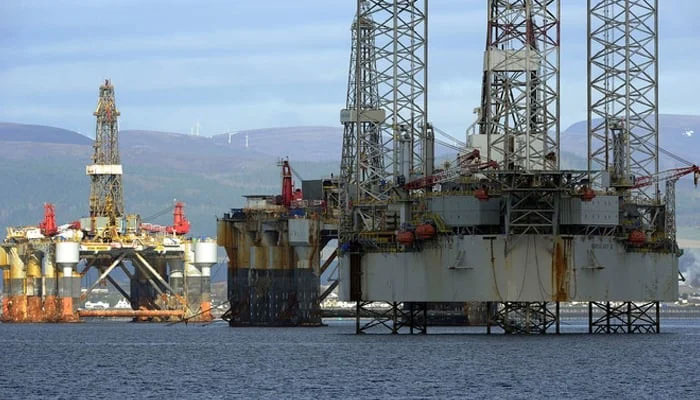Pakistan to auction 20 offshore blocks for oil, gas exploration
New incentives have been introduced to attract companies, as previous policies made exploration costly and unfeasible
ISLAMABAD: The Pakistan government plans to auction 20 offshore blocks for oil and gas exploration to meet the country’s increasing energy demands, Petroleum Minister Musadik Malik informed a parliamentary panel on Wednesday.
Malik also announced that the government was accelerating efforts on onshore tight gas exploration. New incentives have been introduced to attract companies, as previous policies made exploration costly and unfeasible. The minister noted that horizontal drilling involved in tight gas exploration is both expensive and challenging, but work has already commenced on some wells.
During a session of the National Assembly’s Standing Committee on Energy (Petroleum Division), chaired by Syed Mustafa Mehmood, Minister Malik outlined the government’s strategy to boost energy resources amid an ongoing energy crisis. For the first time, the government will auction offshore blocks with the hope of uncovering new reserves.
Malik also addressed concerns over the management of state-owned companies. He confirmed that three subsidiary companies of the Petroleum Division have been transferred to the Sovereign Wealth Fund, despite some committee members expressing worries about potential dissolution plans for the fund. Malik assured that no such discussions have taken place in cabinet meetings.
In a broader discussion on the gas sector, Malik reported a reduction in sector losses due to the installation of new Town Border Stations (TBS) designed to combat gas theft. An employee who is assigned to oversee these stations is responsible for providing profit and loss data to the company. However, he stated that supplying gas to captive power plants is currently unfeasible due to restrictions from the International Monetary Fund (IMF). Malik added that K-Electric power costs three times more than the indigenous gas used by these plants.
A representative from the Sui Southern Gas Company (SSGC) revealed that out of 4,000 industrial units, 750 are captive on the SSGC system. Malik noted that efforts to audit these captive plants have faced legal hurdles, with court stays delaying the process.
The SSGC is grappling with Rs45 billion in losses, exacerbated by court orders that limit the amount of monthly bills the company can collect from domestic consumers, particularly during winter when bills can soar to Rs80,000. Despite these challenges, Malik indicated that losses are trending down, excluding losses attributed to the supply of gas to Balochistan.
The petroleum sector’s circular debt is approaching Rs3 trillion, Malik disclosed. He noted a sharp decline in indigenous gas supplies, with exploration and production companies failing to make significant new discoveries. The committee emphasized the need for efficient natural gas distribution and stricter monitoring to reduce line losses. Future meetings will focus on Corporate Social Responsibility (CSR) mechanisms and initiatives by both public and private oil and gas companies.
-
 Hilary Duff Opens Up About Marriage Fears Despite Strong Bond With Matthew Koma
Hilary Duff Opens Up About Marriage Fears Despite Strong Bond With Matthew Koma -
 ‘Grey’s Anatomy’ Star Eric Dane Breathes His Last At 53
‘Grey’s Anatomy’ Star Eric Dane Breathes His Last At 53 -
 Donald Trump Breaks Silence On Andrew’s Arrest: ‘It’s A Shame’
Donald Trump Breaks Silence On Andrew’s Arrest: ‘It’s A Shame’ -
 DJ Khaled Shares Weight Loss Progress
DJ Khaled Shares Weight Loss Progress -
 Jennifer Aniston And Jim Curtis Share How They Handle Relationship Conflicts
Jennifer Aniston And Jim Curtis Share How They Handle Relationship Conflicts -
 Shamed Andrew Real Birthday Plans As Cops Showed Up At Door
Shamed Andrew Real Birthday Plans As Cops Showed Up At Door -
 Pete Davidson’s Girlfriend Elsie Hewitt Says 'everything Hurts' After Sudden Medical Emergency
Pete Davidson’s Girlfriend Elsie Hewitt Says 'everything Hurts' After Sudden Medical Emergency -
 Princess Beatrice 17 Holidays Per Year Exposed Amid Andrew Arrest
Princess Beatrice 17 Holidays Per Year Exposed Amid Andrew Arrest -
 Who Is 'Queen Of Woke'? UK First Female Civil Head
Who Is 'Queen Of Woke'? UK First Female Civil Head -
 Dwayne Johnson Confesses What Secretly Scares Him More Than Fame
Dwayne Johnson Confesses What Secretly Scares Him More Than Fame -
 Elizabeth Hurley's Son Damian Breaks Silence On Mom’s Romance With Billy Ray Cyrus
Elizabeth Hurley's Son Damian Breaks Silence On Mom’s Romance With Billy Ray Cyrus -
 Shamed Andrew Should Be Happy ‘he Is Only In For Sharing Information’
Shamed Andrew Should Be Happy ‘he Is Only In For Sharing Information’ -
 Daniel Radcliffe Wants Son To See Him As Just Dad, Not Harry Potter
Daniel Radcliffe Wants Son To See Him As Just Dad, Not Harry Potter -
 Apple Sued Over 'child Sexual Abuse' Material Stored Or Shared On ICloud
Apple Sued Over 'child Sexual Abuse' Material Stored Or Shared On ICloud -
 Nancy Guthrie Kidnapped With 'blessings' Of Drug Cartels
Nancy Guthrie Kidnapped With 'blessings' Of Drug Cartels -
 Hailey Bieber Reveals Justin Bieber's Hit Song Baby Jack Is Already Singing
Hailey Bieber Reveals Justin Bieber's Hit Song Baby Jack Is Already Singing




